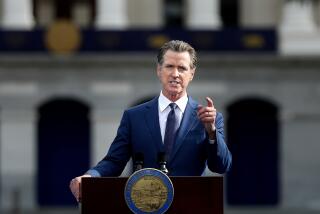Greenspan Urges More Imports of Natural Gas
- Share via
Federal Reserve Chairman Alan Greenspan said Thursday that the U.S. must expand its capacity to import natural gas from overseas to avoid volatile prices that hurt American companies.
“If North American natural-gas markets are to function with the flexibility exhibited by oil, unlimited access to the vast world reserves of gas is required,” Greenspan said in testimony before the Senate Committee on Energy and Natural Resources.
Natural-gas prices have soared 84% in the past year, as increased use of the fuel to generate electricity outpaced growth in domestic supply. Unlike crude oil, natural gas can’t be easily imported from outside of North America. Unusually cold winter weather drained U.S. supplies of the heating fuel, leaving them in late March about 60% lower than a year earlier.
The price surge has prompted efforts to construct terminals for imports of liquefied natural gas and has increased pressure to develop gas fields in environmentally sensitive regions in the Rocky Mountains and Alaska.
Some U.S. manufacturers that rely on the fuel are beginning to feel the pinch of higher prices, Greenspan said.
“To date, the damage is still quite minimal with the obvious exclusion of the chemical industry, very specifically ammonia fertilizers and a number of petrochemical feedstock operations,” he said. “We don’t find at this particular stage that aggregate manufacturing production has been significantly affected.”
Consumption of natural gas at power plants in the U.S. rose 37% from 1997 to 2002, U.S. Energy Department figures showed. The fuel burns more cleanly than oil or coal. Domestic production fell 3.2% last year from a 27-year high in 2001.
Natural-gas futures fell 5% on Thursday on the New York Mercantile Exchange to $5.258 per million British thermal units after an Energy Department report showed a 6.7% rise in U.S. inventories last week, more than some analysts had expected.
Swings in gas prices make it hard for companies to estimate energy costs. The 10-day average volatility in natural-gas futures traded in New York is up 42% from a year ago.
For consumers, the rise in gas prices means they can expect “significantly higher bills” for gas heat this winter, Greenspan said. For gas-dependent industries, the problem so far is lower productivity, rather than job losses, he said.
After Greenspan’s testimony, House Speaker J. Dennis Hastert (R-Ill.) announced formation of a task force to examine the effect of high energy prices on the economy as well as the causes of and possible cures for the tight supply of natural gas.
More to Read
Inside the business of entertainment
The Wide Shot brings you news, analysis and insights on everything from streaming wars to production — and what it all means for the future.
You may occasionally receive promotional content from the Los Angeles Times.










